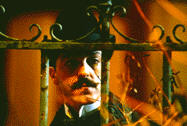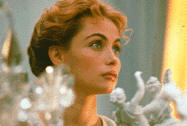 |


|
|
|
|
By John Demetry
 Catherine Deneuve is the modern (and post-modern) queer icon. Lesbians want
to sleep with her; gay men want to find out her secret to ageless beauty.
She is also the iconic bridge between modernist (The Young Girls of
Rochefort) and post-modernist (Time Regained) French cinema. Director
Raul Ruiz utilizes such complex responses to Deneuve as one tool in adapting
Marcel Proust's final volume of the massive In Search of Lost Time. His
hubris is enrapturing.
Catherine Deneuve is the modern (and post-modern) queer icon. Lesbians want
to sleep with her; gay men want to find out her secret to ageless beauty.
She is also the iconic bridge between modernist (The Young Girls of
Rochefort) and post-modernist (Time Regained) French cinema. Director
Raul Ruiz utilizes such complex responses to Deneuve as one tool in adapting
Marcel Proust's final volume of the massive In Search of Lost Time. His
hubris is enrapturing.
Many critics, familiar with the tome, commented that audiences attending Time Regained gain from not reading the book. I have not read the book, but can testify that the film is a complete, mighty pleasure-in a perfect world, it'd be the real Summer blockbuster. In fact, those prejudiced by the book might miss out on Ruiz's use of the material to explore the artform. He takes us on a journey gift-wrapped as a vision of sensuously fluid memory and sexuality. Time regained, cinema rediscovered.
From his point of view, Marcel acts as voyeur to the battles and strained alliances of the idle class. Particularly at the numerous party sequences, he bares witness to the jealousies that drive the characters. Madame Verdurin (the sprightly funny Marie-France Pisier) throws these parties to honor the artists she patronizes. She embarrassingly dotes on one of the artists, the lower-class Morel (Vincent Perez). His many affairs includes one with Saint-Loup (Pascal Greggory), an aristocrat who explains his attraction to men as a desire for military brotherhood. Marcel also uncovers their hidden lives as two of the women he loves (Gilberte and Albertine) confess to lesbian affairs. In a Charlie-Chaplinesque visit to a male brothel, Marcel spies on Baron de Charlus (John Malkovich) being whipped by a prostitute, the camera lens filling with blood. And I haven't given away a half of it! Through his reveries into the past, Proust shares his discovery that these squabbles and secrets testify to deeper impulses. The characters act out on their desires in abominable fashion, but Proust responds with understanding. He shows how they are torn by passion and social reserve, thrown off by the unexpected forms their desires take. This isn't Hollywood "boy-meets-girl" simplifying. Let's give a new name to Hollywood narrative: Heterosexual storytelling. Ruiz (who I presume to be straight), in a supremely humanist act, queers our experience of film spectatorship. He transforms Proust's artistry into a magic-lantern show, a narrated fantasia of film art. Ruiz's wide-eyed approach recognizes film's role in the human desire to capture the moment. He plays out Proust's artistic desires in shifting layers of ambisexual romantic longing; human emotions elevated to metaphysical inquiry (and vice-versa). Memory floods that make up the bulk of the film have silent-movie audacity (significantly lacking digital altering). Not only cutting from "present" to "flashbacks," Ruiz displays supple imagination in his floating camera movements, swerving backgrounds, lighting effects, tiered images, and concentration on actors' facial expressions and on Deneuve's ageless features.
This scene encourages us to call up personal memories of loves and films past. One recognizes Deneuve as DENEUVE more than as her character, she's the goddess at this movie memory party. You may recall her entire career or the way the death of her sister inspired Truffaut's Two English Girls (what with its statue motifs, detailing of artistic creation, and unrequited loves is the older sister to this film). You might identify this film as a kin to Patrice Chereau's life-and cinema-changing queer opus Those Who Love Me Can Take the Train. Chereau's voice dubs some of Mazzarella's dialogue and narration, while Greggory and Perez's appearances link the two films. Profoundly, Ruiz rewrites the history of film language to reflect the flow of infinite sexualities. |

© 1997-2000 BEI
 Ruiz's use of performances takes on the overwhelming power of crashing
waves. In response to Proust's concern with capturing the moments of his
past, Ruiz records the performances of his actors. Standouts include
Deneuve, of course, whose presence at the numerous high-society parties
single out her regal mastering of film space. Also, Emmanuelle Beart as
Gilberte and Chiara Mastroianni as Albertine act as the objects of the lens'
fascination. The broad strokes of Greggory, Perez, and Malkovich painting
their sexually ambiguous characters heighten the sense of performance.
Finally, Mazzarella, one of six actors as Marcel/Proust, has the film's most
moving moment. Mazzarella fails to fight off tears at a musical performance,
which Ruiz choreographs to suggest the individual responses of the audience.
Ruiz's use of performances takes on the overwhelming power of crashing
waves. In response to Proust's concern with capturing the moments of his
past, Ruiz records the performances of his actors. Standouts include
Deneuve, of course, whose presence at the numerous high-society parties
single out her regal mastering of film space. Also, Emmanuelle Beart as
Gilberte and Chiara Mastroianni as Albertine act as the objects of the lens'
fascination. The broad strokes of Greggory, Perez, and Malkovich painting
their sexually ambiguous characters heighten the sense of performance.
Finally, Mazzarella, one of six actors as Marcel/Proust, has the film's most
moving moment. Mazzarella fails to fight off tears at a musical performance,
which Ruiz choreographs to suggest the individual responses of the audience.